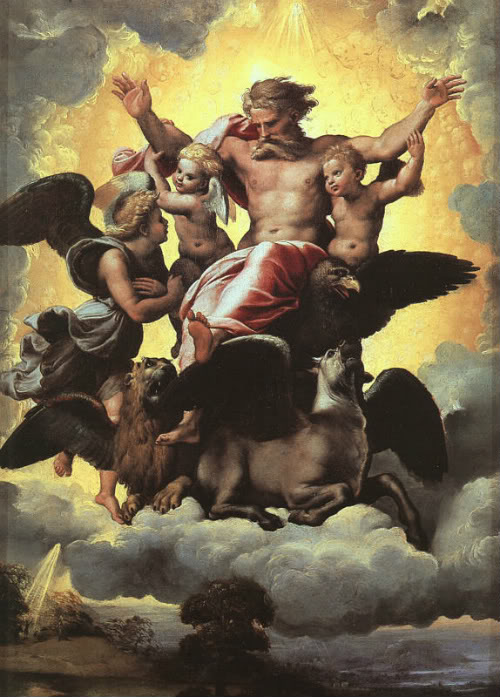
Among the biblical books containing magical formulas, Valentin Tomberg lists the Book of Ezekiel. Moreover, a Hermetist who made Ezekiel’s vision the object of spiritual exercises, would likely become a “profound Cabbalist”. If that is true, then we can regard Pope St Gregory the Great as perhaps the first Cabbalist in the Church. Gregory’s meditations on Ezekiel run to nearly 500 pages in the English translation, yet he only manages to cover about 5 chapters or so.
Under the inspiration of Almighty God, Gregory begins by first explaining the three tenses of prophecy: future, present, past, although we typically consider prophecy applying to the future only. He gives some examples of each:
- Future: “Behold, a Virgin shall conceive and bear a Son.” (Matthew 1:23)
- Present: “The secrets of his heart are made manifest.” (1 Corinthians 14:25)
- Past: “In the beginning, God created Heaven and earth.” (Genesis 1:1)
Gregory explains that prophecy is not a matter of prediction, but rather of revelation. That is why there can be a prophecy of the past and the present; prophecy uncovers hidden truths, truths concealed by time or by present circumstances. He writes: “Prophecy is present when something is concealed, not by the spirit, but by the absent Word, which however is laid bare by the Spirit.”
So there is no prophecy when the Word is absent, until laid bare by the Spirit. Fundamental to Tomberg’s work, is the prophecy in Matthew, since the Word becomes present through the action of the Spirit on the Virgin. As this played out historically, it likewise plays out in consciousness.
Schopenhauer, in the introduction to the World as Will and Idea, criticized the scientist for leaving himself out of his theory. Where is the scientist during the “Big Bang”, the formation of the stars, the beginning of life, the birth of thought? The scientist claims to be taking God’s view, sub specie aeternitatis, the prophet of the past, yet his theory does not even account for himself.
We can ask the analogous question not only about the external world of the scientist, but also of the internal world of the Hermetist. Where is the Hermetist himself in his theories? In Hermetism, the goal of the alchemical marriage is the birth of the Christ, the true Self. Jung describes the self as the whole man, whose symbols are the divine child and its synonyms.
Prior to that birth, the Self is concealed, it is unconscious. In compensation, we are ruled by a false self, or empirical ego, as Tomberg describes:
[the ego or empirical self] is a mere mental image formed on the basis of bodily impressions and the memories thereof, one’s own temperament, character, inclinations, etc., all drawn together as a comprehensive abstraction. Rather, [the real Self] refers to the reality of his center of being, comprising the rememberer in remembering, the thinker in thinking, the feeler in feeling, the willer in willing. This Self is no abstract mental image, but the concrete reality of the inner identity, which, like a thread, brings together into a unity the continuity of all life experience. The real Self of the human being, not the mental image of one’s self [i.e., ego] is the inner “Lord” which stands above the changing conditions of the life of soul with its moods, inclinations, wishes, and kaleidoscope of mental images, and normally it rules over them.
So where is the thinker among this kaleidoscope of mental images? The willer, the feeler? In our sleeping state, the Self is unconscious and the false Ego considers itself “in charge”. In this case, the Self is revealed indirectly through dreams, visions, and so on. In this way, “The secrets of his heart are made manifest“, i.e., the prophecy of the present tense, provided one is able to hear the Spirit.
If sleeping is what conceals the prophecy of the present, then forgetting conceals the prophecy of the past. The Self is revealed as the rememberer. I have proposed an exercise to try to remember this true Self, or the “I”, at the first moment one has become aware of it. Some have discovered it at an early age, others later, and many simply don’t understand the question. Yet even if you are able to remember, where was the Self before that first moment? For that, a prophecy of the past is necessary.
We were known by God before our births as ideas in the Divine Mind. “Before I formed you in the womb I knew you, before you were born I set you apart” (Jer 1:4,5) We were predestined and foreordained and that is what we must remember through the prophecy of the Spirit. We find ourselves thrown into a world, into a family, among a given people, with certain tasks that are presented to us, seemingly against our will. But the rememberer, the thinker, the feeler, the willer turn out to be the same self. Until we can remember, we will always be as strangers and foreigners in the world.
We can be passive and wait, or we can active in the process of remembering the Self. Jung explains the difference in this way:
The difference between the natural individuation process, which runs its course unconsciously, and the one which is consciously realized, is tremendous. In the first case consciousness nowhere intervenes; the end remains as dark as the beginning. In the second case so much darkness comes to light that the personality is permeated with light, and consciousness necessarily gains in scope and insight. The encounter between conscious and unconscious has to ensure that the light which shines in the darkness is not only comprehended by the darkness, but comprehends it.

One Reply to “The Future of Prophecy”
Comments are closed.